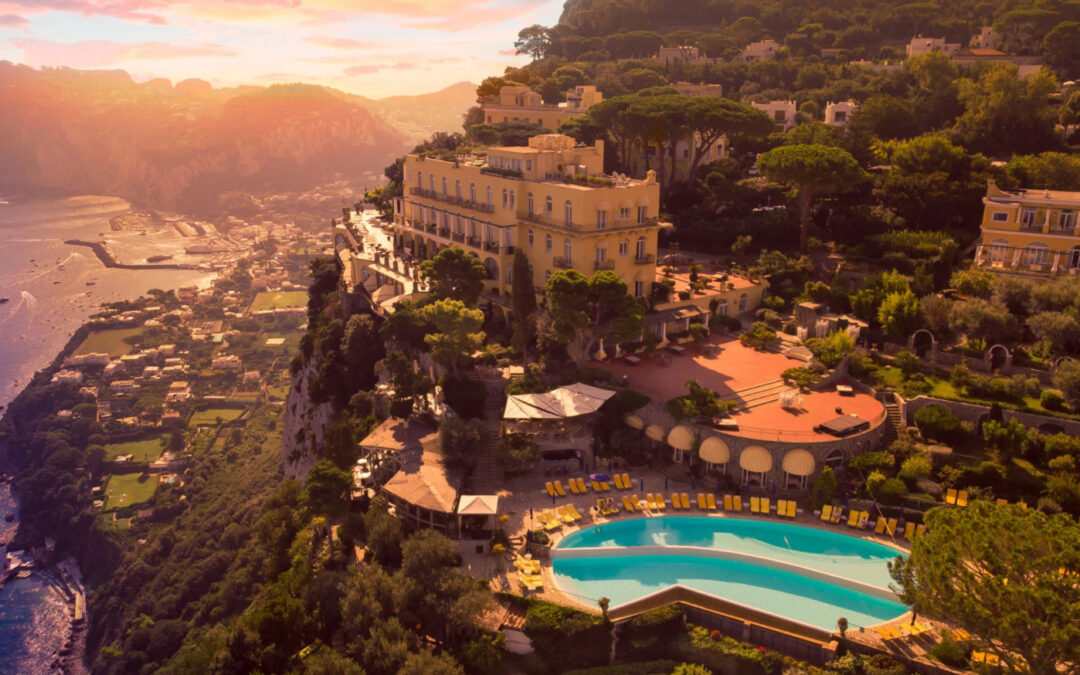The coronavirus pandemic is spurring deal opportunities in Italy’s luxury hotel sector as international travel restrictions aggravate financial woes.
Italy is the only European country with more than 1m hotel rooms and big chains account for only 5 per cent of them, with the rest of the market dominated by small family-owned businesses.
Industry experts believe foreign investors have been deterred by small sizes and fragmented ownership that have undermined profitability. But the crisis threatens to change things as it ravages a sector that was already labouring under heavy debt loads.
The five-star Villa La Vedetta in Florence, for example, has permanently closed while many others, including Rome’s Hotel Raphaël, have not reopened since the first lockdown.
“Italian hotel assets have always been attractive for investors and this year many family-owned businesses are struggling and can’t afford reopening,” said Marie-Louise Sciò chief executive of her family’s Pellicano Hotels company. “There’s lots of activity in terms of real estate investments right now.”
French group Covivio in September finalised the €573m acquisition of seven Italian hotels, including Rome’s Hotel Exedra, from US private equity group Värde Partners, which bought the hotels for €150m in 2017 from Venice’s Boscolo family.
New York hedge fund Elliott Management sold famed Venice hotel Bauer to Austrian real estate group Signa over the summer after only a year of ownership, while London-based Orion Capital announced it was expanding luxury hotel brand Six Senses into Italy after acquiring an 18th century palazzo in Rome.
Gruppo Statuto, the indebted owner of the Danieli Hotel in Venice and the Mandarin Oriental and Four Seasons hotels in Milan, this year launched talks with lenders to reorganise its capital structure only two years after it was bailed out by London-based hedge fund TCI.
“Many institutional investors are searching for hotels in Italy but there’s more demand than availability,” said Bernabò Bocca, chairman of Sina Hotels group and president of the national hotel owners association, Federalberghi.
At the height of the pandemic, Italian opposition parties warned the crisis would lead to “international speculators” sweeping up the country’s prized hotel assets if the government failed to intervene.
It has happened before. Compagnia Italiana Grandi Alberghi, which for most of the 20th century owned the country’s biggest hotels in Venice, Rome and Milan, was sold to US hotel group Sheraton International in 1995 following a painful debt restructuring.
To block distressed domestic hotel owners from selling to foreign investors at a discount, state-backed investor Cassa Depositi e Prestiti has launched a €2bn real estate fund to take over the properties while leaving the management to the former owners with the aim of selling it back to them after 10 years. CDP is the biggest institutional hotel owner in Italy, followed by the Qatari sovereign wealth fund and BNP Paribas.
But some investors believe CDP’s scheme cannot be a long-term solution. “It’s like giving someone who is having a heart attack a cup of warm water,” said Paolo Barletta, chief executive of Gruppo Barletta, who is expanding Rosewood and Soho House into Italy.
“We need a plan to attract international luxury hotel brands that bring affluent tourists to the country,” he added. “It’s absurd that Italy’s hospitality sector is so fragmented and run at a family-level when tourism is such a big part of the country’s economy.”
According to national travel agency Enit, Italy was the top destination for affluent global tourists last year and the luxury tourism market, which is set to lead any recovery after the pandemic, will grow by 6.2 per cent by 2025.
Mr Barletta and Nicola Bulgari, grandson of the eponymous jewellery brand’s founder, recently launched Arsenale, a company that will focus on the acquisition and renovation of hotels in leading Italian tourist destinations that will be run by international hospitality brands.
“We’re looking at several properties in Rome and elsewhere and we’re always the only Italian investor seated at the table,” said Mr Barletta.
“Italy doesn’t have large hotel groups, so it’s obvious owners sell to foreigners, either because they’re struggling to repay debt or because [foreigners] offer more money,” he added.
Some industry insiders are relaxed about acquisitions by overseas groups.
“I don’t think it’s a tragedy if international investors buy hotels in Italy, it’s not great when foreigners buy assets and relocate jobs but hotels can’t be relocated,” Mr Bocca said, although he added that “if you have hedge funds coming in now to buy . . . at a discount because owners are burdened by debt, then it’s a different story”.
But others bemoan the prospect of the latest Italian asset group to fall into foreign ownership.
“I’m not sure the issue is only financial . . . just look at how Italian fashion groups were sold to foreign investors,” said Ms Scio. “There’s a lack of vision.”
Source: Financial Times
Can’t stop reading? Read more
Top private equity news of the week
Top private equity news of the week Aquilius Investment Partners, a Singapore-based real estate...
Investindustrial acquires TreeHouse Foods in $2.9bn move to expand food portfolio
Investindustrial acquires TreeHouse Foods in $2.9bn move to expand food portfolio European private...
Apollo Sports Capital invests in Atlético de Madrid, ushering in new era for Spanish giants
Apollo Sports Capital invests in Atlético de Madrid, ushering in new era for Spanish giants Apollo...




